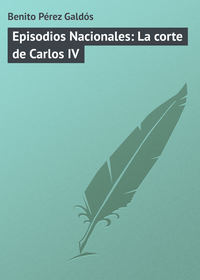 полная версия
полная версияDona Perfecta

Benito Pérez Galdós
Dona Perfecta
INTRODUCTION
The very acute and lively Spanish critic who signs himself Clarin, and is known personally as Don Leopoldo Alas, says the present Spanish novel has no yesterday, but only a day-before-yesterday. It does not derive from the romantic novel which immediately preceded that: the novel, large or little, as it was with Cervantes, Hurtado de Mendoza, Quevedo, and the masters of picaresque fiction.
Clarin dates its renascence from the political revolution of 1868, which gave Spanish literature the freedom necessary to the fiction that studies to reflect modern life, actual ideas, and current aspirations; and though its authors were few at first, “they have never been adventurous spirits, friends of Utopia, revolutionists, or impatient progressists and reformers.” He thinks that the most daring, the most advanced, of the new Spanish novelists, and the best by far, is Don Benito Perez Galdos.
I should myself have made my little exception in favor of Don Armando Palacio Valdes, but Clarin speaks with infinitely more authority, and I am certainly ready to submit when he goes on to say that Galdos is not a social or literary insurgent; that he has no political or religious prejudices; that he shuns extremes, and is charmed with prudence; that his novels do not attack the Catholic dogmas—though they deal so severely with Catholic bigotry—but the customs and ideas cherished by secular fanaticism to the injury of the Church. Because this is so evident, our critic holds, his novels are “found in the bosom of families in every corner of Spain.” Their popularity among all classes in Catholic and prejudiced Spain, and not among free-thinking students merely, bears testimony to the fact that his aim and motive are understood and appreciated, although his stories are apparently so often anti-Catholic.
IDona Perfecta is, first of all, a story, and a great story, but it is certainly also a story that must appear at times potently, and even bitterly, anti-Catholic. Yet it would be a pity and an error to read it with the preoccupation that it was an anti-Catholic tract, for really it is not that. If the persons were changed in name and place, and modified in passion to fit a cooler air, it might equally seem an anti-Presbyterian or anti-Baptist tract; for what it shows in the light of their own hatefulness and cruelty are perversions of any religion, any creed. It is not, however, a tract at all; it deals in artistic largeness with the passion of bigotry, as it deals with the passion of love, the passion of ambition, the passion of revenge. But Galdos is Spanish and Catholic, and for him the bigotry wears a Spanish and Catholic face. That is all.
Up to a certain time, I believe, Galdos wrote romantic or idealistic novels, and one of these I have read, and it tired me very much. It was called “Marianela,” and it surprised me the more because I was already acquainted with his later work, which is all realistic. But one does not turn realist in a single night, and although the change in Galdos was rapid it was not quite a lightning change; perhaps because it was not merely an outward change, but artistically a change of heart. His acceptance in his quality of realist was much more instant than his conversion, and vastly wider; for we are told by the critic whom I have been quoting that Galdos’s earlier efforts, which he called Episodios Nacionales, never had the vogue which his realistic novels have enjoyed.
These were, indeed, tendencious, if I may Anglicize a very necessary word from the Spanish tendencioso. That is, they dealt with very obvious problems, and had very distinct and poignant significations, at least in the case of “Dona Perfecta,” “Leon Roch,” and “Gloria.” In still later novels, Emilia Pardo-Bazan thinks, he has comprehended that “the novel of to-day must take note of the ambient truth, and realize the beautiful with freedom and independence.” This valiant lady, in the campaign for realism which she made under the title of “La Cuestion Palpitante”—one of the best and strongest books on the subject—counts him first among Spanish realists, as Clarin counts him first among Spanish novelists. “With a certain fundamental humanity,” she says, “a certain magisterial simplicity in his creations, with the natural tendency of his clear intelligence toward the truth, and with the frankness of his observation, the great novelist was always disposed to pass over to realism with arms and munitions; but his aesthetic inclinations were idealistic, and only in his latest works has he adopted the method of the modern novel, fathomed more and more the human heart, and broken once for all with the picturesque and with the typical personages, to embrace the earth we tread.”
For her, as I confess for me, “Dona Perfecta” is not realistic enough—realistic as it is; for realism at its best is not tendencious. It does not seek to grapple with human problems, but is richly content with portraying human experiences; and I think Senora Pardo-Bazan is right in regarding “Dona Perfecta” as transitional, and of a period when the author had not yet assimilated in its fullest meaning the faith he had imbibed.
IIYet it is a great novel, as I said; and perhaps because it is transitional it will please the greater number who never really arrive anywhere, and who like to find themselves in good company en route. It is so far like life that it is full of significations which pass beyond the persons and actions involved, and envelop the reader, as if he too were a character of the book, or rather as if its persons were men and women of this thinking, feeling, and breathing world, and he must recognize their experiences as veritable facts. From the first moment to the last it is like some passage of actual events in which you cannot withhold your compassion, your abhorrence, your admiration, any more than if they took place within your personal knowledge. Where they transcend all facts of your personal knowledge, you do not accuse them of improbability, for you feel their potentiality in yourself, and easily account for them in the alien circumstance. I am not saying that the story has no faults; it has several. There are tags of romanticism fluttering about it here and there; and at times the author permits himself certain old-fashioned literary airs and poses and artifices, which you simply wonder at. It is in spite of these, and with all these defects, that it is so great and beautiful a book.
IIIWhat seems to be so very admirable in the management of the story is the author’s success in keeping his own counsel. This may seem a very easy thing; but, if the reader will think over the novelists of his acquaintance, he will find that it is at least very uncommon. They mostly give themselves away almost from the beginning, either by their anxiety to hide what is coming, or their vanity in hinting what great things they have in store for the reader. Galdos does neither the one nor the other. He makes it his business to tell the story as it grows; to let the characters unfold themselves in speech and action; to permit the events to happen unheralded. He does not prophesy their course, he does not forecast the weather even for twenty-four hours; the atmosphere becomes slowly, slowly, but with occasional lifts and reliefs, of such a brooding breathlessness, of such a deepening density, that you feel the wild passion-storm nearer and nearer at hand, till it bursts at last; and then you are astonished that you had not foreseen it yourself from the first moment.
Next to this excellent method, which I count the supreme characteristic of the book merely because it represents the whole, and the other facts are in the nature of parts, is the masterly conception of the characters. They are each typical of a certain side of human nature, as most of our personal friends and enemies are; but not exclusively of this side or that. They are each of mixed motives, mixed qualities; none of them is quite a monster; though those who are badly mixed do such monstrous things.
Pepe Rey, who is such a good fellow—so kind, and brave, and upright, and generous, so fine a mind, and so high a soul—is tactless and imprudent; he even condescends to the thought of intrigue; and though he rejects his plots at last, his nature has once harbored deceit. Don Inocencio, the priest, whose control of Dona Perfecta’s conscience has vitiated the very springs of goodness in her, is by no means bad, aside from his purposes. He loves his sister and her son tenderly, and wishes to provide for them by the marriage which Pepe’s presence threatens to prevent. The nephew, though selfish and little, has moments of almost being a good fellow; the sister, though she is really such a lamb of meekness, becomes a cat, and scratches Don Inocencio dreadfully when he weakens in his design against Pepe.
Rosario, one of the sweetest and purest images of girlhood that I know in fiction, abandons herself with equal passion to the love she feels for her cousin Pepe, and to the love she feels for her mother, Dona Perfecta. She is ready to fly with him, and yet she betrays him to her mother’s pitiless hate.
But it is Dona Perfecta herself who is the transcendent figure, the most powerful creation of the book. In her, bigotry and its fellow-vice, hypocrisy, have done their perfect work, until she comes near to being a devil, and really does some devil’s deeds. Yet even she is not without some extenuating traits. Her bigotry springs from her conscience, and she is truly devoted to her daughter’s eternal welfare; she is of such a native frankness that at a certain point she tears aside her mask of dissimulation and lets Pepe see all the ugliness of her perverted soul. She is wonderfully managed. At what moment does she begin to hate him, and to wish to undo her own work in making a match between him and her daughter? I could defy anyone to say. All one knows is that at one moment she adores her brother’s son, and at another she abhors him, and has already subtly entered upon her efforts to thwart the affection she has invited in him for her daughter.
Caballuco, what shall I say of Caballuco? He seems altogether bad, but the author lets one imagine that this cruel, this ruthless brute must have somewhere about him traits of lovableness, of leniency, though he never lets one see them. His gratitude to Dona Perfecta, even his murderous devotion, is not altogether bad; and he is certainly worse than nature made him, when wrought upon by her fury and the suggestion of Don Inocencio. The scene where they work him up to rebellion and assassination is a compendium of the history of intolerance; as the mean little conceited city of Orbajosas is the microcosm of bigoted and reactionary Spain.
IVI have called, or half-called, this book tendencious; but in a certain larger view it is not so. It is the eternal interest of passion working upon passion, not the temporary interest of condition antagonizing condition, which renders “Dona Perfecta” so poignantly interesting, and which makes its tragedy immense. But there is hope as well as despair in such a tragedy. There is the strange support of a bereavement in it, the consolation of feeling that for those who have suffered unto death, nothing can harm them more; that even for those who have inflicted their suffering this peace will soon come.
“Is Perez Galdos a pessimist?” asks the critic Clarin. “No, certainly; but if he is not, why does he paint us sorrows that seem inconsolable? Is it from love of paradox? Is it to show that his genius, which can do so much, can paint the shadow lovelier than the light? Nothing of this. Nothing that is not serious, honest, and noble, is to be found in this novelist. Are they pessimistic, those ballads of the North, that always end with vague resonances of woe? Are they pessimists, those singers of our own land, who surprise us with tears in the midst of laughter? Is Nature pessimistic, who is so sad at nightfall that it seems as if day were dying forever? . . . The sadness of art, like that of nature, is a form of hope. Why is Christianity so artistic? Because it is the religion of sadness.”
W. D. HOWELLS.CHAPTER I
VILLAHORRENDA! FIVE MINUTES!
When the down train No. 65—of what line it is unnecessary to say—stopped at the little station between kilometres 171 and 172, almost all the second-and third-class passengers remained in the cars, yawning or asleep, for the penetrating cold of the early morning did not invite to a walk on the unsheltered platform. The only first-class passenger on the train alighted quickly, and addressing a group of the employes asked them if this was the Villahorrenda station.
“We are in Villahorrenda,” answered the conductor whose voice was drowned by the cackling of the hens which were at that moment being lifted into the freight car. “I forgot to call you, Senor de Rey. I think they are waiting for you at the station with the beasts.”
“Why, how terribly cold it is here!” said the traveller, drawing his cloak more closely about him. “Is there no place in the station where I could rest for a while, and get warm, before undertaking a journey on horseback through this frozen country?”
Before he had finished speaking the conductor, called away by the urgent duties of his position, went off, leaving our unknown cavalier’s question unanswered. The latter saw that another employe was coming toward him, holding a lantern in his right hand, that swung back and forth as he walked, casting the light on the platform of the station in a series of zigzags, like those described by the shower from a watering-pot.
“Is there a restaurant or a bedroom in the station of Villahorrenda?” said the traveller to the man with the lantern.
“There is nothing here,” answered the latter brusquely, running toward the men who were putting the freight on board the cars, and assuaging them with such a volley of oaths, blasphemies, and abusive epithets that the very chickens, scandalized by his brutality, protested against it from their baskets.
“The best thing I can do is to get away from this place as quickly as possible,” said the gentlemen to himself. “The conductor said that the beasts were here.”
Just as he had come to this conclusion he felt a thin hand pulling him gently and respectfully by the cloak. He turned round and saw a figure enveloped in a gray cloak, and out of whose voluminous folds peeped the shrivelled and astute countenance of a Castilian peasant. He looked at the ungainly figure, which reminded one of the black poplar among trees; he observed the shrewd eyes that shone from beneath the wide brim of the old velvet hat; the sinewy brown hand that grasped a green switch, and the broad foot that, with every movement, made the iron spur jingle.
“Are you Senor Don Jose de Rey?” asked the peasant, raising his hand to his hat.
“Yes; and you, I take it,” answered the traveller joyfully, “are Dona Perfecta’s servant, who have come to the station to meet me and show me the way to Orbajosa?”
“The same. Whenever you are ready to start. The pony runs like the wind. And Senor Don Jose, I am sure, is a good rider. For what comes by race—”
“Which is the way out?” asked the traveller, with impatience. “Come, let us start, senor—What is your name?”
“My name is Pedro Lucas,” answered the man of the gray cloak, again making a motion to take off his hat; “but they call me Uncle Licurgo. Where is the young gentleman’s baggage?”
“There it is—there under the cloak. There are three pieces—two portmanteaus and a box of books for Senor Don Cayetano. Here is the check.”
A moment later cavalier and squire found themselves behind the barracks called a depot, and facing a road which, starting at this point, disappeared among the neighboring hills, on whose naked slopes could be vaguely distinguished the miserable hamlet of Villahorrenda. There were three animals to carry the men and the luggage. A not ill-looking nag was destined for the cavalier; Uncle Licurgo was to ride a venerable hack, somewhat loose in the joints, but sure-footed; and the mule, which was to be led by a stout country boy of active limbs and fiery blood, was to carry the luggage.
Before the caravan had put itself in motion the train had started, and was now creeping along the road with the lazy deliberation of a way train, awakening, as it receded in the distance, deep subterranean echoes. As it entered the tunnel at kilometre 172, the steam issued from the steam whistle with a shriek that resounded through the air. From the dark mouth of the tunnel came volumes of whitish smoke, a succession of shrill screams like the blasts of a trumpet followed, and at the sound of its stentorian voice villages, towns, the whole surrounding country awoke. Here a cock began to crow, further on another. Day was beginning to dawn.
CHAPTER II
A JOURNEY IN THE HEART OF SPAIN
When they had proceeded some distance on their way and had left behind them the hovels of Villahorrenda, the traveller, who was young and handsome spoke thus:
“Tell me, Senor Solon—”
“Licurgo, at your service.”
“Senor Licurgo, I mean. But I was right in giving you the name of a wise legislator of antiquity. Excuse the mistake. But to come to the point. Tell me, how is my aunt?”
“As handsome as ever,” answered the peasant, pushing his beast forward a little. “Time seems to stand still with Senora Dona Perfecta. They say that God gives long life to the good, and if that is so that angel of the Lord ought to live a thousand years. If all the blessings that are showered on her in this world were feathers, the senora would need no other wings to go up to heaven with.”
“And my cousin, Senorita Rosario?”
“The senora over again!” said the peasant. “What more can I tell you of Dona Rosarito but that that she is the living image of her mother? You will have a treasure, Senor Don Jose, if it is true, as I hear, that you have come to be married to her. She will be a worthy mate for you, and the young lady will have nothing to complain of, either. Between Pedro and Pedro the difference is not very great.”
“And Senor Don Cayetano?”
“Buried in his books as usual. He has a library bigger than the cathedral; and he roots up the earth, besides, searching for stones covered with fantastical scrawls, that were written, they say, by the Moors.”
“How soon shall we reach Orbajosa?”
“By nine o’clock, God willing. How delighted the senora will be when she sees her nephew! And yesterday, Senorita Rosario was putting the room you are to have in order. As they have never seen you, both mother and daughter think of nothing else but what Senor Don Jose is like, or is not like. The time has now come for letters to be silent and tongues to talk. The young lady will see her cousin and all will be joy and merry-making. If God wills, all will end happily, as the saying is.”
“As neither my aunt nor my cousin has yet seen me,” said the traveller smiling, “it is not wise to make plans.”
“That’s true; for that reason it was said that the bay horse is of one mind and he who saddles him of another,” answered the peasant. “But the face does not lie. What a jewel you are getting! and she, what a handsome man!”
The young man did not hear Uncle Licurgo’s last words, for he was preoccupied with his own thoughts. Arrived at a bend in the road, the peasant turned his horse’s head in another direction, saying:
“We must follow this path now. The bridge is broken, and the river can only be forded at the Hill of the Lilies.”
“The Hill of the Lilies,” repeated the cavalier, emerging from his revery. “How abundant beautiful names are in these unattractive localities! Since I have been travelling in this part of the country the terrible irony of the names is a constant surprise to me. Some place that is remarkable for its barren aspect and the desolate sadness of the landscape is called Valleameno (Pleasant Valley). Some wretched mud-walled village stretched on a barren plain and proclaiming its poverty in diverse ways has the insolence to call itself Villarica (Rich Town); and some arid and stony ravine, where not even the thistles can find nourishment, calls itself, nevertheless, Valdeflores (Vale of Flowers). That hill in front of us is the Hill of the Lilies? But where, in Heaven’s name, are the lilies? I see nothing but stones and withered grass. Call it Hill of Desolation, and you will be right. With the exception of Villahorrenda, whose appearance corresponds with its name, all is irony here. Beautiful words, a prosaic and mean reality. The blind would be happy in this country, which for the tongue is a Paradise and for the eyes a hell.”
Senor Licurgo either did not hear the young man’s words, or, hearing, he paid no attention to them. When they had forded the river, which, turbid and impetuous, hurried on with impatient haste, as if fleeing from its own hands, the peasant pointed with outstretched arm to some barren and extensive fields that were to be seen on the left, and said:
“Those are the Poplars of Bustamante.”
“My lands!” exclaimed the traveller joyfully, gazing at the melancholy fields illumined by the early morning light. “For the first time, I see the patrimony which I inherited from my mother. The poor woman used to praise this country so extravagantly, and tell me so many marvellous things about it when I was a child, that I thought that to be here was to be in heaven. Fruits, flowers, game, large and small; mountains, lakes, rivers, romantic streams, pastoral hills, all were to be found in the Poplars of Bustamante; in this favored land, the best and most beautiful on the earth. But what is to be said? The people of this place live in their imaginations. If I had been brought here in my youth, when I shared the ideas and the enthusiasm of my dear mother, I suppose that I, too, would have been enchanted with these bare hills, these arid or marshy plains, these dilapidated farmhouses, these rickety norias, whose buckets drip water enough to sprinkle half a dozen cabbages, this wretched and barren desolation that surrounds me.”
“It is the best land in the country,” said Senor Licurgo; “and for the chick-pea, there is no other like it.”
“I am delighted to hear it, for since they came into my possession these famous lands have never brought me a penny.”
The wise legislator of Sparta scratched his ear and gave a sigh.
“But I have been told,” continued the young man, “that some of the neighboring proprietors have put their ploughs in these estates of mine, and that, little by little, they are filching them from me. Here there are neither landmarks nor boundaries, nor real ownership, Senor Licurgo.”
The peasant, after a pause, during which his subtle intellect seemed to be occupied in profound disquisitions, expressed himself as follows:
“Uncle Paso Largo, whom, for his great foresight, we call the Philosopher, set his plough in the Poplars, above the hermitage, and bit by bit, he has gobbled up six fanegas.”
“What an incomparable school!” exclaimed the young man, smiling. “I wager that he has not been the only—philosopher?”
“It is a true saying that one should talk only about what one knows, and that if there is food in the dove-cote, doves won’t be wanting. But you, Senor Don Jose, can apply to your own cause the saying that the eye of the master fattens the ox, and now that you are here, try and recover your property.”
“Perhaps that would not be so easy, Senor Licurgo,” returned the young man, just as they were entering a path bordered on either side by wheat-fields, whose luxuriance and early ripeness gladdened the eye. “This field appears to be better cultivated. I see that all is not dreariness and misery in the Poplars.”
The peasant assumed a melancholy look, and, affecting something of disdain for the fields that had been praised by the traveller, said in the humblest of tones:
“Senor, this is mine.”
“I beg your pardon,” replied the gentleman quickly; “now I was going to put my sickle in your field. Apparently the philosophy of this place is contagious.”
They now descended into a canebrake, which formed the bed of a shallow and stagnant brook, and, crossing it, they entered a field full of stones and without the slightest trace of vegetation.
“This ground is very bad,” said the young man, turning round to look at his companion and guide, who had remained a little behind. “You will hardly be able to derive any profit from it, for it is all mud and sand.”









